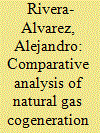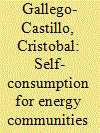|
|
|
Sort Order |
|
|
|
Items / Page
|
|
|
|
|
|
|
| Srl | Item |
| 1 |
ID:
176817


|
|
|
|
|
| Summary/Abstract |
An analysis to assess the influence of country-dependent variables and incentives on the feasibility of natural gas cogeneration projects in Latin America is presented in this work. The analysis is performed using a hypothetical industrial plant, where the cogeneration solution consists in the recovery of waste heat from the power generation for steam production. The feasibility is evaluated by calculating the Return of Investment (ROI) and the Internal Rate of Return (IRR) of the project. Eight Latin American countries are studied considering their specific natural gas markets, regulation, and macroeconomic variables. Two scenarios, electricity production for self-consumption and electricity production with power surplus sale, are independently analyzed considering the effects of available incentives. In the countries where the project is feasible, the application of incentives leads to a significant reduction in the ROI and, consequently, to an increment in the IRR. The effect of the interest rate and environmental impact were also analyzed. In general terms, along the region, the regulation for cogeneration is incipient while incentives are very standard and similar respect to lowering of import, Value-Added Tax (VAT), and income taxes, which seems to be designed purely to promote capital investment. Following the results from this study, it is of paramount importance to create new policy instruments in the future to advance the regulatory framework for cogeneration in Latin America.
|
|
|
|
|
|
|
|
|
|
|
|
|
|
|
|
| 2 |
ID:
177437


|
|
|
|
|
| Summary/Abstract |
Distributed energy resources (DERs) may enable prosumers to deliver demand response under dynamic energy pricing schemes. Facing wholesale market prices, the DER scheduling of a profit-maximising prosumer minimises the total system energy cost as well. However, regulated electricity bill components, i.a., distribution tariffs for recovering grid costs, may distort these price signals. To study the impact of distribution tariff structures on DER scheduling, we develop a short-term linear optimisation model that determines the cost-optimal DER schedule based on wholesale electricity prices and a distribution tariff. We compare five distribution tariff structures for four combinations of PV, batteries, and heat pumps, and define two metrics to characterise the results: (i) the novel ‘relative flexibility value’, which quantifies energy cost inefficiencies, and (ii) ‘rate of self-consumption’. In a case study, we show how prosumers make trade-offs between energy and distribution costs, depending on the distribution tariff structure. We describe the mechanisms through which different distribution tariff structures alter DER operations, and quantify the tariffs' impact on the system energy cost. Generally, we find that tariff types which stimulate self-consumption increase the system energy cost and vice versa.
|
|
|
|
|
|
|
|
|
|
|
|
|
|
|
|
| 3 |
ID:
192807


|
|
|
|
|
| Summary/Abstract |
Grid-connected photovoltaic (PV) facilities are more attractive than ever due to the electricity price surges and the reduction of solar energy generation costs. This paper develops a solving procedure including a simulation model to analyze the techno-economic performance of PV-battery facilities, taking into account the latest Spanish regulatory framework. The procedure finds the best facilities for multiple objectives, maximum profitability and maximum self-sufficiency, in different locations, load profiles and economic scenarios. The results indicate that PV modules are profitable without subsidies, with installations between 1 and 6 kWp. Meanwhile, batteries are only convenient when seeking maximum independence from the grid, with capacities up to 9 kWh. The findings suggest that the economic feasibility of facilities is influenced by the location and compensation rate surplus electricity, while the facility is mainly determined by the load profile. A sensitivity analysis shows that a variation in grid tariffs and technology prices has a limited impact on the facility's size but modifies the system's profitability. Finally, an analysis of the latest unprecedented grid price surges indicates that self-consumption facilities help become a more resilient society against unexpected events. Therefore, policymakers should keep promoting the adoption of these technologies and keep the current advantageous regulations.
|
|
|
|
|
|
|
|
|
|
|
|
|
|
|
|
| 4 |
ID:
177164


|
|
|
|
|
| Summary/Abstract |
The development of photovoltaic (PV) energy has been very significant in the last years, thanks to cost reductions brought about by policy actions favouring the transition from a fossil to a green society. As this transition is likely to stretch over the long term, policy support must be programmed accordingly. In light of the human and economic shock effected by COVID-19, the Italian government has offered a tax deduction of 110% over 5 years for the realization of new PV residential plants. We propose to integrate this tool with the application of a bonus for energy produced and self-consumed, in order to support the development of decentralized systems. In this paper, we provide an economic assessment of a 3 kW plant in the context of several policy scenarios. The results underline the great opportunity for consumers to tackle climate change whilst obtaining relevant economic profits. The study can be replicated on a global scale.
|
|
|
|
|
|
|
|
|
|
|
|
|
|
|
|
| 5 |
ID:
166949


|
|
|
|
|
| Summary/Abstract |
The recent rise of distributed generation and self-consumption, together with the unbundling of the electricity supply chain, sprout the opportunity for innovative energy policies that increasingly place end-users as active agents of the system and democratize access to the energy markets. Such is the case of the emerging concepts of virtual metering, peer-to-peer energy trading, shared generation and local network charges, hereby grouped under the umbrella policy genre “Prosumer Aggregation Policies”. This paper sets out to describe the fundamental mechanisms within these concepts, to categorize them and their policy impacts, in order to guide regulators, decision-makers and the research community through the key steps and considerations involved in the design of Prosumer Aggregation Policies. Based on a comprehensive assessment of country experiences and a showcase of real business models and pilot projects, it is argued that prosumer aggregation policies significantly enhance prosumers’ drivers and improve the potential market of distributed generation and traditional self-consumption policies, ultimately providing policy access to all end-users regardless of possessing the appropriate site or resource conditions. They also address challenges for grid operators regarding grid integration and market integration of distributed generation, helping to minimize their impact in grid management.
|
|
|
|
|
|
|
|
|
|
|
|
|
|
|
|
| 6 |
ID:
166350


|
|
|
|
|
| Summary/Abstract |
This paper studies the decision to synchronize household electricity consumption and production. While this behavior is beneficial for the energy system as a whole, it is not encouraged by a net-metering system. Relying on a large-scale survey conducted among households with solar PV in Wallonia, we investigate the factors impacting their decision to self-consume. As many as forty percent of our respondents declare to do so, notwithstanding the lack of incentives. The multivariate regression analysis shows that female and older residents, who tend to spend more time at home during daytime, are more likely to adapt their electricity usage by displacing their load. Prosumers with high environmental motives tend to synchronize more no matter the size of their installation. We conclude that prosumers will be further encouraged to self-consume by (1) setting monetary incentives to make consumption at the time of production more attractive, by (2) providing information to prosumers relative to their consumption/production profile and (3) by encouraging the adoption of smart devices that facilitate load shifting. These policies would lead to a higher degree of synchronization that would be beneficial for the energy system.
|
|
|
|
|
|
|
|
|
|
|
|
|
|
|
|
| 7 |
ID:
177399


|
|
|
|
|
| Summary/Abstract |
European climate polices acknowledge the role that energy communities can play in the energy transition. Self-consumption installations shared among those living in the same building are a good example of such energy communities. In this work, a regional analysis of optimal self-consumption installations under the new legal framework recently passed in Spain is performed. Results show that the optimal sizing of the installation leads to economic savings for self-consumers in all the territory, for both options with and without remuneration for energy surplus. A sensitivity analysis on technology costs revealed that batteries still require noticeably cost reductions to be cost-effective in a behind the meter self-consumption environment. In addition, solar compensation mechanisms make batteries less attractive in a scenario of low PV costs, since feeding PV surplus into the grid, yet less efficient, becomes more cost-effective. An improvement for the energy surplus remuneration policy in the context of the current legislation was proposed and analysed. It consists in the inclusion of the economic value of the avoided power losses in the remuneration.
|
|
|
|
|
|
|
|
|
|
|
|
|
|
|
|
|
|
|
|
|